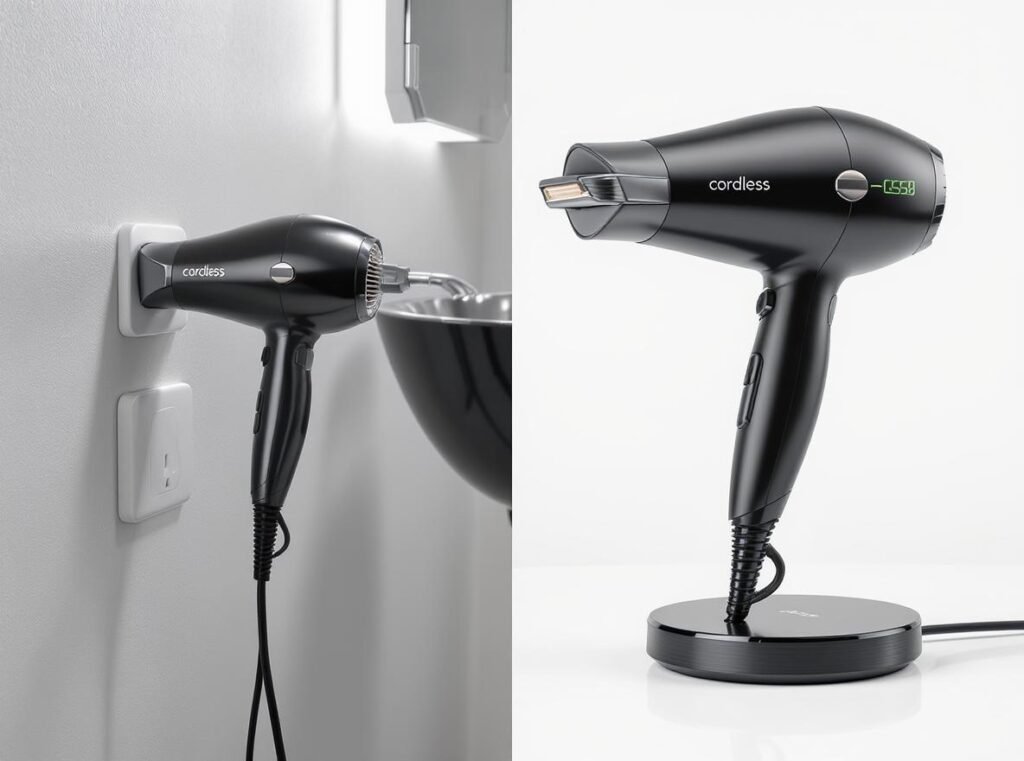Choosing between a cordless and corded hair dryer can feel overwhelming when you’re investing in professional hair styling equipment. With so many options flooding the market, you need to understand which type delivers the performance, reliability, and value your business demands.
Corded hair dryers are the superior choice for professional use, offering consistent high power (1800-2500W), unlimited runtime, and proven durability that cordless models (typically under 600W) simply cannot match. Corded hair dryers plug into an electrical outlet and provide continuous, high power for as long as needed, while cordless hair dryers run on rechargeable batteries with limited runtime and power output. With corded models dominating 78.5% of the market share, they remain the preferred choice for professionals and serious users.
Ready to discover why professionals consistently choose corded models? Let’s dive into the complete comparison that will transform your hair dryer purchasing decisions.
Table of Contents
ToggleWhat Are the Main Differences Between Cordless and Corded Hair Dryers?
Understanding the fundamental differences between these two hair dryer types is crucial for making an informed business decision that impacts your customers’ satisfaction and your bottom line.
The main differences lie in power source, output capability, and operational limitations. Corded models typically deliver higher wattage (often 1800–2500W), resulting in faster and more efficient drying, while cordless models usually max out around 600W.
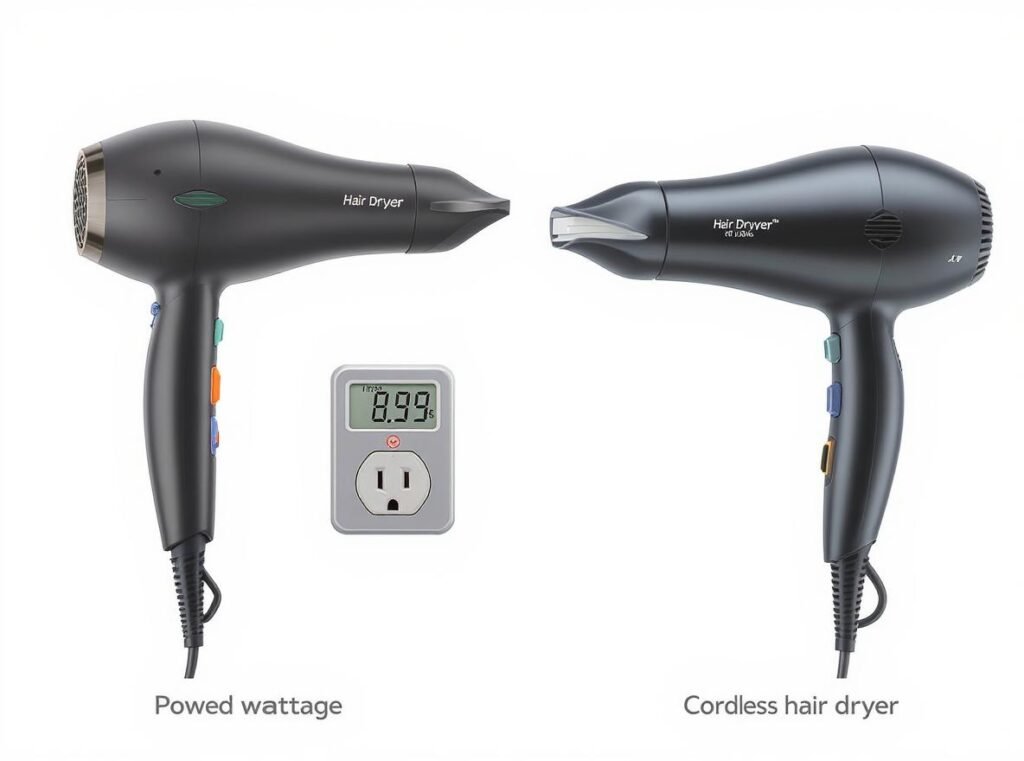
Power Source and Performance
Corded hair dryers draw power directly from electrical outlets, providing consistent voltage and amperage throughout use. This direct connection eliminates power fluctuations that can affect drying performance, ensuring your customers get reliable results every time.
Cordless hair dryers run on rechargeable batteries, offering portability and freedom from outlets but with limited runtime and power output. As battery levels drop during operation, motor performance decreases, resulting in reduced airflow and heat output when customers need it most.
Operational and Design Considerations
The power disparity creates significant differences in real-world performance. Higher wattage translates to stronger airflow and faster drying times, which is particularly important for customers with thick, long, or difficult-to-dry hair types.
| Feature | Corded Hair Dryers | Cordless Hair Dryers |
|---|---|---|
| Power Output | 1800-2500+ watts | Under 600 watts |
| Runtime | Unlimited | 15-45 minutes |
| Charging Time | N/A | 2-4 hours |
| Market Share | 78.5% | 21.5% |
| Professional Use | Ideal | Limited |
| Portability | Limited by cord | Excellent |
Why Do Professional Salons Choose Corded Hair Dryers?
Professional environments demand reliability, power, and consistent performance that only corded models can deliver effectively throughout demanding workdays.
Professional salons overwhelmingly use corded hair dryers due to their consistent high power, unlimited runtime, advanced features, and superior durability. Salon-grade corded dryers are built for heavy use and have longer lifespans under professional conditions.
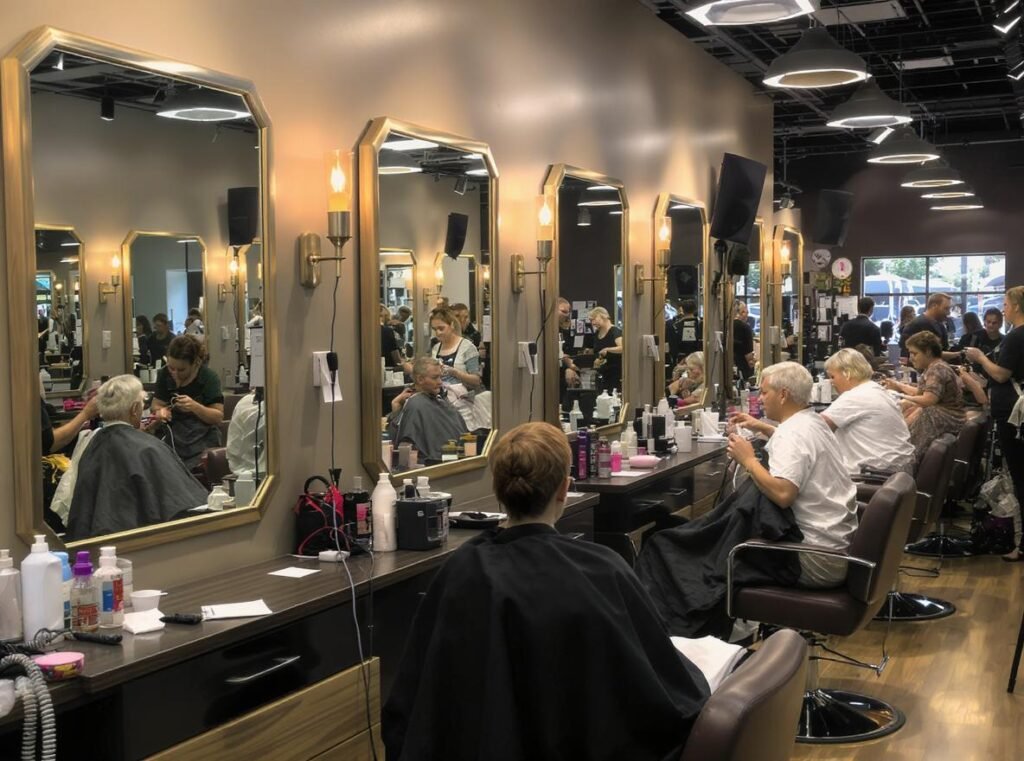
Unmatched Power and Efficiency
Corded dryers provide the strong airflow and heat required for quick, efficient drying and styling, which is essential in a busy salon environment. The superior motor technology in corded models generates stronger airflow that penetrates thick, coarse hair more effectively than battery-powered alternatives.
Professional-grade performance features include:
- Consistent high-wattage output throughout the styling session
- Multiple heat and speed settings for diverse hair types
- Advanced technologies like ionic and ceramic integration
- Cool shot buttons for setting styles
- Professional attachments for specialized techniques
Unlimited Operational Capacity
There are no interruptions for charging, allowing for continuous use throughout the day. This is crucial for busy salons that may operate 8-12 hours daily with back-to-back appointments.
Advanced Professional Features
Corded dryers offer a wider range of settings (heat, speed, cool shot), attachments, and technologies (ionic, ceramic), which are crucial for diverse hair types and styling needs. These features enable stylists to customize their approach for each client’s specific requirements.
Built for Commercial Use
Professional corded dryers feature heavy-duty construction designed specifically for commercial environments, including reinforced cords, durable housing materials, and motors rated for extended daily use.
What Are the Real Advantages of Cordless Hair Dryers?
While corded models dominate professional settings, cordless hair dryers do offer specific benefits for certain market segments and use cases.
Cordless hair dryers excel in portability, freedom of movement, and convenience for quick touch-ups. Lightweight and compact, cordless dryers are easy to carry, making them perfect for travel or quick styling on the go.
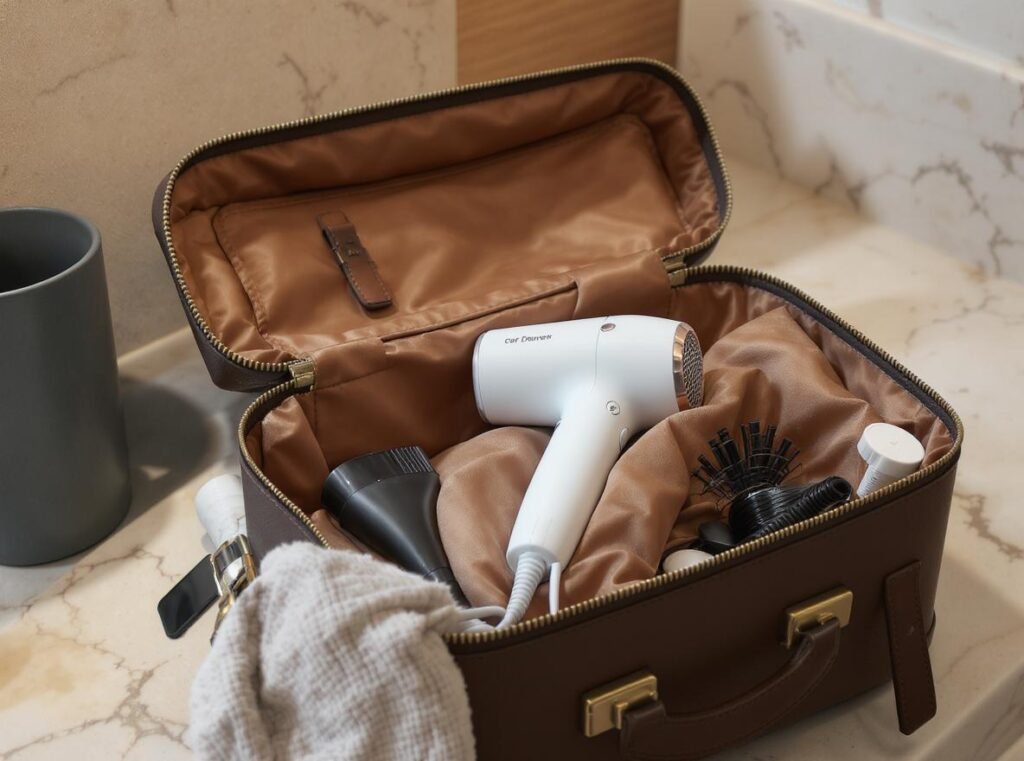
Superior Portability and Travel Convenience
No cord means unrestricted movement, which can be convenient for personal use in various settings. This makes them particularly valuable for:
- Frequent business travelers who need reliable styling tools
- Mobile stylists working at events or client locations
- Gym and fitness center applications
- Hotel and hospitality amenities
Specialized Use Cases
Ideal for rapid touch-ups during travel, at the gym, or backstage at events. The convenience factor appeals to specific customer segments who prioritize mobility over maximum power.
Freedom from Outlet Constraints
Cordless models eliminate the need to locate electrical outlets, making them useful in outdoor settings, older buildings with limited outlets, or situations where cord management is challenging.
| Application | Cordless Suitability | Primary Benefit |
|---|---|---|
| Professional Salons | Poor | Insufficient power/runtime |
| Daily Home Use | Fair | Limited by battery constraints |
| Travel | Excellent | Compact and cord-free |
| Quick Touch-ups | Good | Convenient for brief use |
| Mobile Styling | Limited | Battery life restrictions |
What Are the Major Disadvantages of Cordless Hair Dryers?
Understanding the significant limitations of cordless models is crucial for making informed recommendations and managing customer expectations.
Cordless hair dryers suffer from limited power output, short battery life, higher costs, and fewer advanced features compared to corded alternatives. Most cordless models offer lower wattage than corded dryers, resulting in slower drying times, especially for thick or long hair.
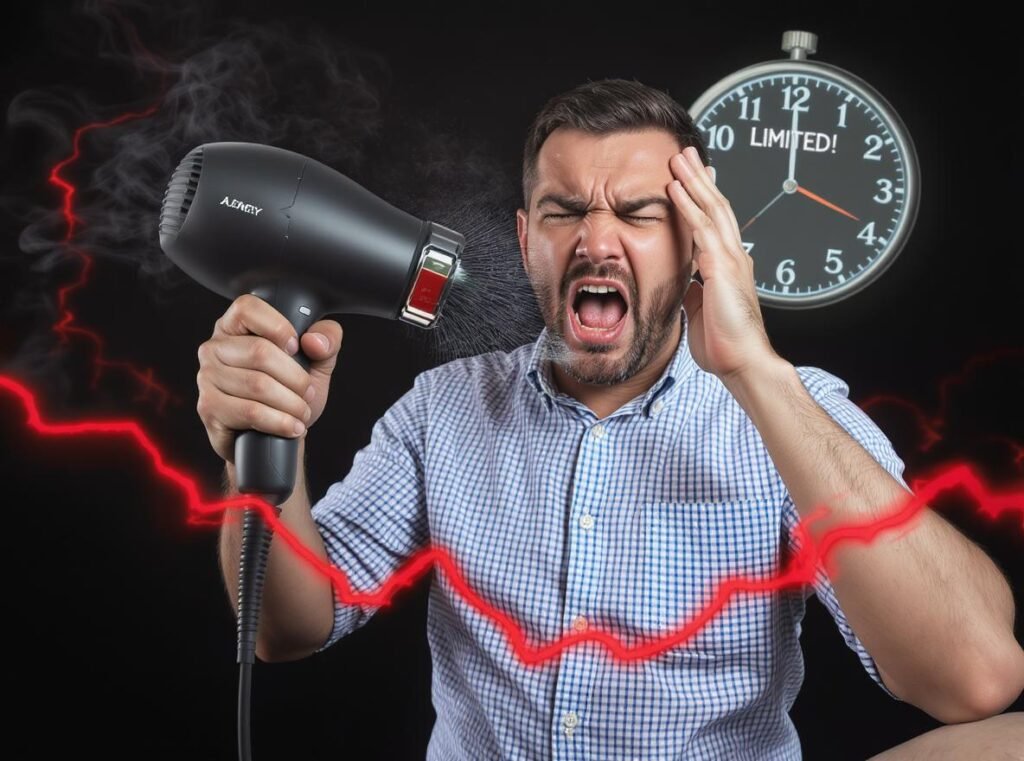
Significant Power Limitations
Battery runtime may not last long enough for a full styling session, requiring frequent recharging. This creates several practical problems:
The reduced wattage means longer drying times, which can damage hair through extended heat exposure. Battery degradation over time further reduces performance and runtime. Inconsistent power delivery as batteries drain during use.
Economic Disadvantages
Advanced battery technology and innovative features make cordless dryers more expensive, often at a premium compared to similarly performing corded models. The total cost of ownership often exceeds corded alternatives due to:
- Higher initial purchase prices
- Battery replacement costs after 2-3 years
- Reduced lifespan compared to corded models
- Higher energy costs for frequent charging cycles
Feature and Capability Limitations
Cordless models may lack advanced settings and attachments found in professional corded dryers. Manufacturers must compromise on features to preserve battery life, resulting in:
- Fewer heat and speed combinations
- Limited or no cool shot functionality
- Reduced attachment compatibility
- Less sophisticated motor technology
Professional Unsuitability
The combination of limited runtime, reduced power, and charging requirements makes cordless models impractical for professional environments where consistent, high-performance operation is essential.
How Does Power Output Affect Hair Drying Performance?
Power output directly correlates with drying efficiency, styling capability, and overall user satisfaction, making it a critical factor in product selection.
Higher wattage translates to faster drying times, better heat distribution, and superior styling results. The wattage determines the airflow and heat a dryer can produce. Higher wattage (1800–2500W) means faster, more efficient drying and less heat exposure time, which is healthier for hair.
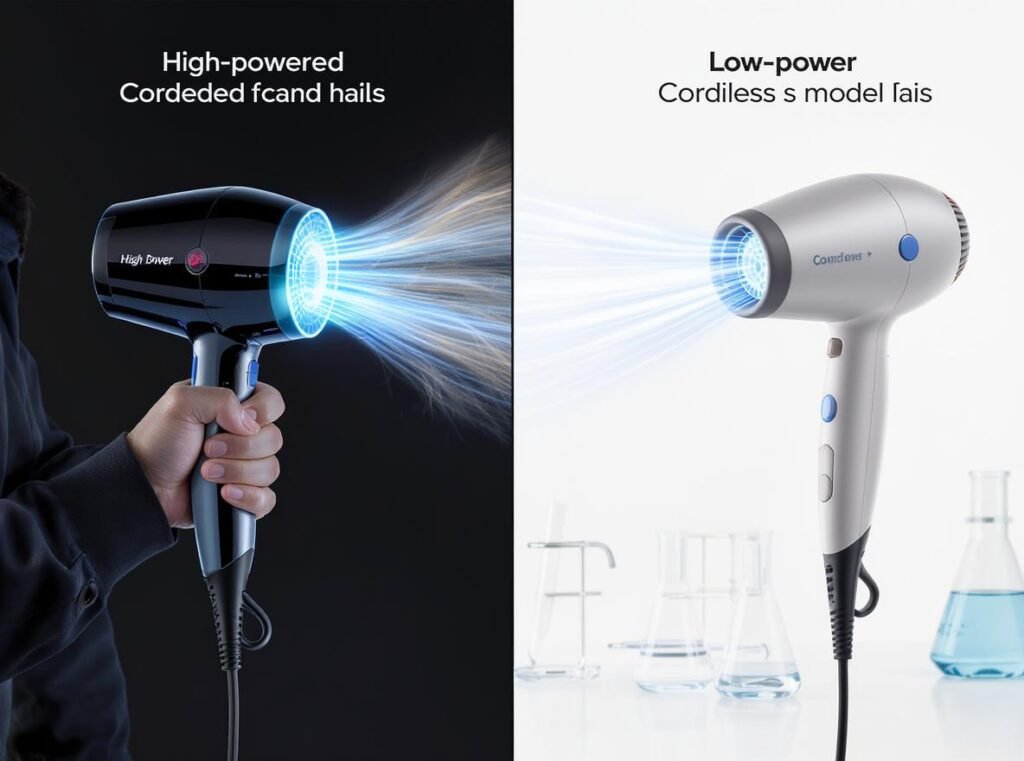
Wattage and Performance Relationship
Cordless dryers, often under 600W, take longer to dry hair and may struggle with thick or long hair. This performance gap becomes particularly noticeable with:
- Thick, coarse, or curly hair textures
- Long hair that requires significant moisture removal
- Time-sensitive styling situations
- Professional applications requiring speed and efficiency
Heat Distribution and Hair Health
Higher wattage enables more efficient heat distribution, reducing the time hair is exposed to damaging temperatures. This results in:
Better heat control that prevents hot spots and uneven drying. More effective ionic technology integration for frizz reduction. Superior styling results with enhanced shine and smoothness. Reduced overall styling time, minimizing heat damage.
Professional Styling Capabilities
Professional-grade wattage enables advanced styling techniques that lower-powered alternatives cannot achieve:
- Volume creation through powerful root lifting
- Smooth, sleek finishes requiring strong airflow
- Effective moisture removal for lasting styles
- Precise control for detailed styling work
The power advantage becomes crucial when working with challenging hair types or creating sophisticated styles that require consistent, strong airflow throughout the entire styling process.
Which Hair Dryer Type Offers Better Value for Money?
Value assessment requires considering initial costs, operational expenses, durability, performance, and long-term customer satisfaction.
Corded hair dryers provide superior long-term value despite potentially higher upfront costs, thanks to their durability, consistent performance, and lower operational requirements. Corded hair dryers offer better value for most users due to lower cost, higher power, more features, and longer lifespans.

Market Position and Customer Preference
They dominate the market with a 78.5% share, reflecting strong consumer and professional preference. This market dominance indicates proven customer satisfaction and repeat purchase behavior.
Total Cost of Ownership Analysis
Cordless hair dryers provide value mainly for those prioritizing portability and convenience, but their higher price and lower performance make them less cost-effective for everyday or professional use.
| Cost Factor | Corded Models | Cordless Models |
|---|---|---|
| Initial Investment | $30-$300 | $50-$400 |
| Annual Energy Cost | $15-$25 | $25-$40 |
| Lifespan | 5-7 years | 2-3 years |
| Performance Consistency | Constant | Declining |
| Replacement Frequency | Lower | Higher |
| Feature Set | Comprehensive | Limited |
Business Impact for Retailers
For wholesalers and retailers, corded models offer:
- Higher customer satisfaction rates
- Lower return and warranty claim rates
- Better profit margins on professional-grade models
- Stronger brand reputation through reliable product performance
- Consistent repeat business from satisfied customers
Return on Investment Considerations
Professional establishments and serious home users see better ROI with corded models through faster service delivery, reduced equipment downtime, and enhanced customer satisfaction leading to retention and referrals.
What Should Wholesalers and Retailers Know About Market Demand?
Understanding current market trends and customer preferences is essential for optimizing inventory decisions and sales strategies.
The hair dryer market shows clear preferences based on usage patterns and customer segments. Corded hair dryers remain the dominant product, favored for their reliability, performance, and affordability.

Market Segmentation Insights
Interest in cordless models is rising, driven by travel, convenience, and technological improvements, but they still represent a niche market. Understanding these segments helps optimize product mix:
Younger users and frequent travelers are more likely to seek cordless options, while professionals and households prefer corded models. This demographic information guides targeted marketing and inventory decisions.
Professional Market Demands
The professional segment represents significant opportunity for B2B suppliers, with consistent demand for high-performance corded models. Key factors driving professional purchases include:
- Reliability requirements for daily commercial operation
- Power specifications meeting professional styling standards
- Durability for extended operational life
- Comprehensive warranty and service support
Consumer Segment Analysis
Different consumer groups show distinct preferences:
- Daily users prioritize performance and reliability (corded preference)
- Occasional users may consider convenience factors (mixed preference)
- Travel-focused customers value portability (cordless consideration)
- Budget-conscious buyers seek best performance per dollar (corded advantage)
Inventory Strategy Recommendations
| Customer Segment | Recommended Focus | Key Products |
|---|---|---|
| Professional Stylists | High-end corded models | 2000W+ professional dryers |
| Home Power Users | Mid-range corded | 1800-2000W consumer models |
| Travel Market | Select cordless options | Compact, lightweight models |
| Budget Segment | Entry-level corded | Reliable, basic feature sets |
How to Choose the Right Hair Dryer for Your Customers?
Providing expert guidance helps customers make informed decisions while building trust, driving sales, and reducing returns for your business.
Success in hair dryer sales requires understanding customer needs, usage patterns, hair types, and performance expectations to recommend the most suitable option. For professional or frequent home use: Recommend corded dryers with high wattage, multiple settings, and durability.

Customer Assessment Framework
Help customers evaluate their specific requirements through targeted questions:
- What is their typical daily usage pattern?
- What hair type, length, and texture do they have?
- Do they need professional-grade performance capability?
- How important is portability versus performance?
- What is their realistic budget range?
- Do they have specific styling goals or techniques?
Professional and Frequent Use Recommendations
For salon owners, professional stylists, and serious home users, emphasize the performance advantages of corded models. The Conason P1C high-speed hair dryer delivers professional-grade performance with advanced ionic technology, multiple heat and speed settings, and the powerful motor construction that professionals demand for consistent, reliable operation.
Travel and Convenience Users
For travel, gym, or occasional touch-ups: Suggest cordless models, emphasizing portability and convenience. However, ensure customers understand the power and runtime limitations before purchase.
Hair Type Considerations
Thick or long hair requires higher power; finer hair can use lower wattage. Match wattage recommendations to hair characteristics:
- Fine, short hair: 1200-1600W sufficient
- Medium thickness: 1600-1800W recommended
- Thick, long, or coarse hair: 1800W+ essential
- Professional styling: 2000W+ preferred
Feature Matching Strategy
Match the price point and desired features (ionic technology, attachments, weight) to customer preferences. Consider:
- Ionic technology for frizz-prone hair
- Multiple heat/speed settings for versatility
- Cool shot function for style setting
- Professional attachments for advanced styling
- Ergonomic design for comfort during extended use
Market Positioning Approach
Stock a mix of reliable corded models and a select range of innovative cordless dryers to meet evolving consumer demands. Focus inventory on proven performers while maintaining options for niche segments.
For comprehensive professional-grade solutions, explore our complete product collection at https://conason.com/product/ where you’ll find hair dryers designed for demanding commercial and serious home use applications.
Summary
Corded hair dryers emerge as the clear winner for professional applications and regular home use, offering superior power (1800-2500W vs under 600W), unlimited runtime, and exceptional long-term value. With 78.5% market share, they remain the preferred choice across all user segments except specialized travel applications. While cordless models provide portability benefits, their significant limitations in power output, battery life, higher costs, and reduced features make them suitable only for specific niche uses. For wholesalers, distributors, and retailers, focusing on high-quality corded models ensures customer satisfaction, reduces returns, and builds lasting business relationships.
Ready to explore professional-grade hair dryers that deliver the consistent performance your customers demand? Contact us today to discuss wholesale opportunities and discover why industry professionals choose Conason for reliable, powerful hair styling solutions that drive customer satisfaction and business success.

